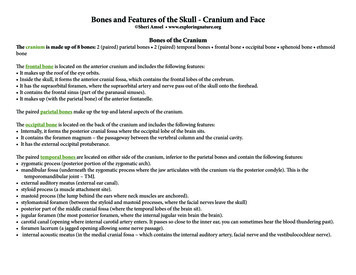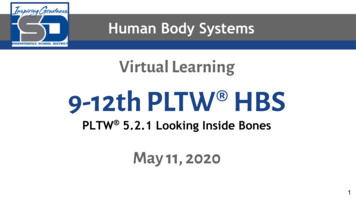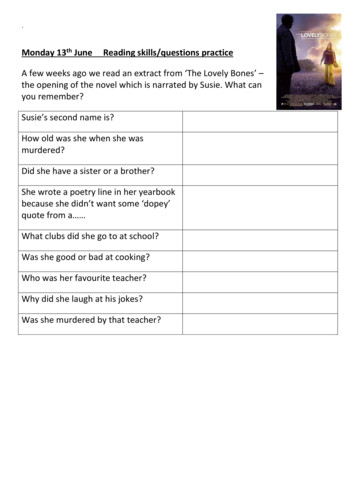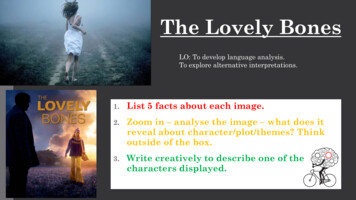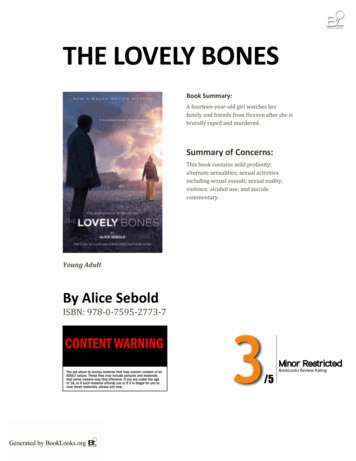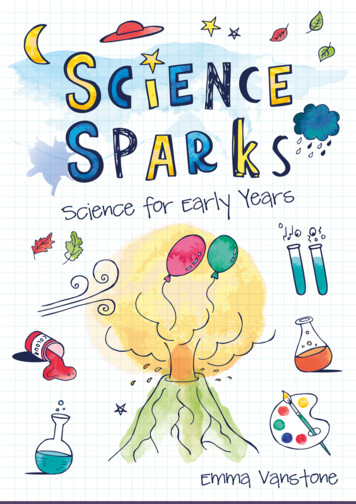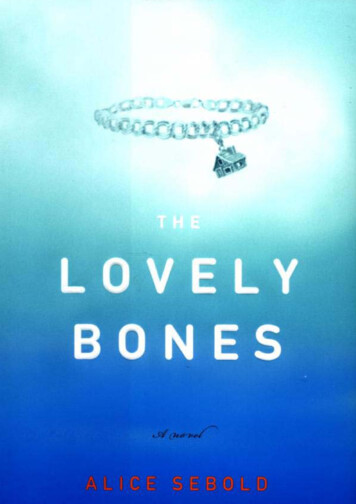
Transcription
The Lovely BonesAlice Sebold
Always, Glen
Inside the snow globe on my father’s desk, there was a penguin wearing a redand-white-striped scarf. When I was little my father would pull me into his lapand reach for the snow globe. He would turn it over, letting all the snow collect onthe top, then quickly invert it. The two of us watched the snow fall gently aroundthe penguin. The penguin was alone in there, I thought, and I worried for him.When I told my father this, he said, “Don’t worry, Susie; he has a nice life. He’strapped in a perfect world.”
OneMy name was Salmon, like the fish; first name, Susie. I was fourteen when I wasmurdered on December 6, 1973. In newspaper photos of missing girls from theseventies, most looked like me: white girls with mousy brown hair. This wasbefore kids of all races and genders started appearing on milk cartons or in thedaily mail. It was still back when people believed things like that didn’t happen.In my junior high yearbook I had a quote from a Spanish poet my sister hadturned me on to, Juan Ramón Jiménez. It went like this: “If they give you ruledpaper, write the other way.” I chose it both because it expressed my contempt formy structured surroundings à la the classroom and because, not being somedopey quote from a rock group, I thought it marked me as literary. I was amember of the Chess Club and Chem Club and burned everything I tried to makein Mrs. Delminico’s home ec class. My favorite teacher was Mr. Botte, who taughtbiology and liked to animate the frogs and crawfish we had to dissect by makingthem dance in their waxed pans.I wasn’t killed by Mr. Botte, by the way. Don’t think every person you’re goingto meet in here is suspect. That’s the problem. You never know. Mr. Botte cameto my memorial (as, may I add, did almost the entire junior high school – I wasnever so popular) and cried quite a bit. He had a sick kid. We all knew this, sowhen he laughed at his own jokes, which were rusty way before I had him, welaughed too, forcing it sometimes just to make him happy. His daughter died ayear and a half after I did. She had leukemia, but I never saw her in my heaven.My murderer was a man from our neighborhood. My mother liked his borderflowers, and my father talked to him once about fertilizer. My murderer believedin old-fashioned things like eggshells and coffee grounds, which he said his ownmother had used. My father came home smiling, making jokes about how theman’s garden might be beautiful but it would stink to high heaven once a heatwave hit.But on December 6, 1973, it was snowing, and I took a shortcut through thecornfield back from the junior high. It was dark out because the days wereshorter in winter, and I remember how the broken cornstalks made my walkmore difficult. The snow was falling lightly, like a flurry of small hands, and I wasbreathing through my nose until it was running so much that I had to open mymouth. Six feet from where Mr. Harvey stood, I stuck my tongue out to taste asnowflake.“Don’t let me startle you,” Mr. Harvey said.Of course, in a cornfield, in the dark, I was startled. After I was dead I thoughtabout how there had been the light scent of cologne in the air but that I had notbeen paying attention, or thought it was coming from one of the houses upahead.“Mr. Harvey,” I said.
“You’re the older Salmon girl, right?”“Yes.”“How are your folks?”Although the eldest in my family and good at acing a science quiz, I had neverfelt comfortable with adults.“Fine,” I said. I was cold, but the natural authority of his age, and the addedfact that he was a neighbor and had talked to my father about fertilizer, rootedme to the spot.“I’ve built something back here,” he said. “Would you like to see?”“I’m sort of cold, Mr. Harvey,” I said, “and my mom likes me home beforedark.”“It’s after dark, Susie,” he said.I wish now that I had known this was weird. I had never told him my name. Iguess I thought my father had told him one of the embarrassing anecdotes hesaw merely as loving testaments to his children. My father was the kind of dadwho kept a nude photo of you when you were three in the downstairs bathroom,the one that guests would use. He did this to my little sister, Lindsey, thank God.At least I was spared that indignity. But he liked to tell a story about how, onceLindsey was born, I was so jealous that one day while he was on the phone in theother room, I moved down the couch – he could see me from where he stood –and tried to pee on top of Lindsey in her carrier. This story humiliated me everytime he told it, to the pastor of our church, to our neighbor Mrs. Stead, who wasa therapist and whose take on it he wanted to hear, and to everyone who eversaid “Susie has a lot of spunk!”“Spunk!” my father would say. “Let me tell you about spunk,” and he wouldlaunch immediately into his Susie-peed-on-Lindsey story.But as it turned out, my father had not mentioned us to Mr. Harvey or toldhim the Susie-peed-on-Lindsey story.Mr. Harvey would later say these words to my mother when he ran into her onthe street: “I heard about the horrible, horrible tragedy. What was yourdaughter’s name, again?”“Susie,” my mother said, bracing up under the weight of it, a weight that shenaïvely hoped might lighten someday, not knowing that it would only go on tohurt in new and varied ways for the rest of her life.Mr. Harvey told her the usual: “I hope they get the bastard. I’m sorry for yourloss.”I was in my heaven by that time, fitting my limbs together, and couldn’tbelieve his audacity. “The man has no shame,” I said to Franny, my intakecounselor. “Exactly,” she said, and made her point as simply as that. Therewasn’t a lot of bullshit in my heaven.Mr. Harvey said it would only take a minute, so I followed him a little fartherinto the cornfield, where fewer stalks were broken off because no one used it as ashortcut to the junior high. My mom had told my baby brother, Buckley, that the
corn in the field was inedible when he asked why no one from the neighborhoodate it. “The corn is for horses, not humans,” she said. “Not dogs?” Buckley asked.“No,” my mother answered. “Not dinosaurs?” Buckley asked. And it went likethat.“I’ve made a little hiding place,” said Mr. Harvey.He stopped and turned to me.“I don’t see anything,” I said. I was aware that Mr. Harvey was looking at mestrangely. I’d had older men look at me that way since I’d lost my baby fat, butthey usually didn’t lose their marbles over me when I was wearing my royal blueparka and yellow elephant bell-bottoms. His glasses were small and round withgold frames, and his eyes looked out over them and at me.“You should be more observant, Susie,” he said.I felt like observing my way out of there, but I didn’t. Why didn’t I? Frannysaid these questions were fruitless: “You didn’t and that’s that. Don’t mull it over.It does no good. You’re dead and you have to accept it.”“Try again,” Mr. Harvey said, and he squatted down and knocked against theground.“What’s that?” I asked.My ears were freezing. I wouldn’t wear the multicolored cap with the pompomand jingle bells that my mother had made me one Christmas. I had shoved it inthe pocket of my parka instead.I remember that I went over and stomped on the ground near him. It feltharder even than frozen earth, which was pretty hard.“It’s wood,” Mr. Harvey said. “It keeps the entrance from collapsing. Otherthan that it’s all made out of earth.”“What is it?” I asked. I was no longer cold or weirded out by the look he hadgiven me. I was like I was in science class: I was curious.“Come and see.”It was awkward to get into, that much he admitted once we were both insidethe hole. But I was so amazed by how he had made a chimney that would drawsmoke out if he ever chose to build a fire that the awkwardness of getting in andout of the hole wasn’t even on my mind. You could add to that that escape wasn’ta concept I had any real experience with. The worst I’d had to escape was Artie,a strange-looking kid at school whose father was a mortician. He liked to pretendhe was carrying a needle full of embalming fluid around with him. On hisnotebooks he would draw needles spilling dark drips.“This is neato!” I said to Mr. Harvey. He could have been the hunchback ofNotre Dame, whom we had read about in French class. I didn’t care. I completelyreverted. I was my brother Buckley on our day-trip to the Museum of NaturalHistory in New York, where he’d fallen in love with the huge skeletons on display.I hadn’t used the word neato in public since elementary school.“Like taking candy from a baby,” Franny said.
I can still see the hole like it was yesterday, and it was. Life is a perpetualyesterday for us. It was the size of a small room, the mud room in our house,say, where we kept our boots and slickers and where Mom had managed to fit awasher and dryer, one on top of the other. I could almost stand up in it, but Mr.Harvey had to stoop. He’d created a bench along the sides of it by the way he’ddug it out. He immediately sat down.“Look around,” he said.I stared at it in amazement, the dug-out shelf above him where he had placedmatches, a row of batteries, and a battery-powered fluorescent lamp that castthe only light in the room – an eerie light that would make his features hard tosee when he was on top of me.There was a mirror on the shelf, and a razor and shaving cream. I thoughtthat was odd. Wouldn’t he do that at home? But I guess I figured that a man whohad a perfectly good split-level and then built an underground room only half amile away had to be kind of loo-loo. My father had a nice way of describingpeople like him: “The man’s a character, that’s all.”So I guess I was thinking that Mr. Harvey was a character, and I liked theroom, and it was warm, and I wanted to know how he had built it, what themechanics of the thing were and where he’d learned to do something like that.But by the time the Gilberts’ dog found my elbow three days later and broughtit home with a telling corn husk attached to it, Mr. Harvey had closed it up. I wasin transit during this. I didn’t get to see him sweat it out, remove the woodreinforcement, bag any evidence along with my body parts, except that elbow. Bythe time I popped up with enough wherewithal to look down at the goings-on onEarth, I was more concerned with my family than anything else.My mother sat on a hard chair by the front door with her mouth open. Herpale face paler than I had ever seen it. Her blue eyes staring. My father wasdriven into motion. He wanted to know details and to comb the cornfield alongwith the cops. I still thank God for a small detective named Len Fenerman. Heassigned two uniforms to take my dad into town and have him point out all theplaces I’d hung out with my friends. The uniforms kept my dad busy in one mallfor the whole first day. No one had told Lindsey, who was thirteen and wouldhave been old enough, or Buckley, who was four and would, to be honest, neverfully understand.Mr. Harvey asked me if I would like a refreshment. That was how he put it. Isaid I had to go home.“Be polite and have a Coke,” he said. “I’m sure the other kids would.”“What other kids?”“I built this for the kids in the neighborhood. I thought it could be some sort ofclubhouse.”I don’t think I believed this even then. I thought he was lying, but I thought itwas a pitiful lie. I imagined he was lonely. We had read about men like him inhealth class. Men who never married and ate frozen meals every night and wereso afraid of rejection that they didn’t even own pets. I felt sorry for him.
“Okay,” I said, “I’ll have a Coke.”In a little while he said, “Aren’t you warm, Susie? Why don’t you take off yourparka.”I did.After this he said, “You’re very pretty, Susie.”“Thanks,” I said, even though he gave me what my friend Clarissa and I haddubbed the skeevies.“Do you have a boyfriend?”“No, Mr. Harvey,” I said. I swallowed the rest of my Coke, which was a lot,and said, “I got to go, Mr. Harvey. This is a cool place, but I have to go.”He stood up and did his hunchback number by the six dug-in steps that led tothe world. “I don’t know why you think you’re leaving.”I talked so that I would not have to take in this knowledge: Mr. Harvey was nocharacter. He made me feel skeevy and icky now that he was blocking the door.“Mr. Harvey, I really have to get home.”“Take off your clothes.”“What?”“Take your clothes off,” Mr. Harvey said. “I want to check that you’re still avirgin.”“I am, Mr. Harvey,” I said.“I want to make sure. Your parents will thank me.”“My parents?”“They only want good girls,” he said.“Mr. Harvey,” I said, “please let me leave.”“You aren’t leaving, Susie. You’re mine now.”Fitness was not a big thing back then; aerobics was barely a word. Girls weresupposed to be soft, and only the girls we suspected were butch could climb theropes at school.I fought hard. I fought as hard as I could not to let Mr. Harvey hurt me, butmy hard-as-I-could was not hard enough, not even close, and I was soon lyingdown on the ground, in the ground, with him on top of me panting and sweating,having lost his glasses in the struggle.I was so alive then. I thought it was the worst thing in the world to be lyingflat on my back with a sweating man on top of me. To be trapped inside the earthand have no one know where I was.I thought of my mother.My mother would be checking the dial of the clock on her oven. It was a newoven and she loved that it had a clock on it. “I can time things to the minute,”she told her own mother, a mother who couldn’t care less about ovens.She would be worried, but more angry than worried, at my lateness. As myfather pulled into the garage, she would rush about, fixing him a cocktail, a drysherry, and put on an exasperated face: “You know junior high,” she would say.
“Maybe it’s Spring Fling.” “Abigail,” my father would say, “how can it be SpringFling when it’s snowing?” Having failed with this, my mother might rush Buckleyinto the room and say, “Play with your father,” while she ducked into the kitchenand took a nip of sherry for herself.Mr. Harvey started to press his lips against mine. They were blubbery and wetand I wanted to scream but I was too afraid and too exhausted from the fight. Ihad been kissed once by someone I liked. His name was Ray and he was Indian.He had an accent and was dark. I wasn’t supposed to like him. Clarissa called hislarge eyes, with their half-dosed lids, “freak-a-delic,” but he was nice and smartand helped me cheat on my algebra exam while pretending he hadn’t. He kissedme by my locker the day before we turned in our photos for the yearbook. Whenthe yearbook came out at the end of the summer, I saw that under his picture hehad answered the standard “My heart belongs to” with “Susie Salmon.” I guesshe had had plans. I remember that his lips were chapped.“Don’t, Mr. Harvey,” I managed, and I kept saying that one word a lot. Don’t.And I said please a lot too. Franny told me that almost everyone begged “please”before dying.“I want you, Susie,” he said.“Please,” I said. “Don’t,” I said. Sometimes I combined them. “Please don’t” or“Don’t please.” It was like insisting that a key works when it doesn’t or yelling“I’ve got it, I’ve got it, I’ve got it” as a softball goes sailing over you into thestands.“Please don’t.”But he grew tired of hearing me plead. He reached into the pocket of myparka and balled up the hat my mother had made me, smashing it into mymouth. The only sound I made after that was the weak tinkling of bells.As he kissed his wet lips down my face and neck and then began to shove hishands up under my shirt, I wept. I began to leave my body; I began to inhabitthe air and the silence. I wept and struggled so I would not feel. He ripped openmy pants, not having found the invisible zipper my mother had artfully sewn intotheir side.“Big white panties,” he said.I felt huge and bloated. I felt like a sea in which he stood and pissed and shat.I felt the corners of my body were turning in on themselves and out, like in cat’scradle, which I played with Lindsey just to make her happy. He started workinghimself over me.“Susie! Susie!” I heard my mother calling. “Dinner is ready.”He was inside me. He was grunting.“We’re having string beans and lamb.”I was the mortar, he was the pestle.“Your brother has a new finger painting, and I made apple crumb cake.”
Mr. Harvey made me lie still underneath him and listen to the beating of his heartand the beating of mine. How mine skipped like a rabbit, and how his thudded, ahammer against cloth. We lay there with our bodies touching, and, as I shook, apowerful knowledge took hold. He had done this thing to me and I had lived. Thatwas all. I was still breathing. I heard his heart. I smelled his breath. The darkearth surrounding us smelled like what it was, moist dirt where worms andanimals lived their daily lives. I could have yelled for hours.I knew he was going to kill me. I did not realize then that I was an animalalready dying.“Why don’t you get up?” Mr. Harvey said as he rolled to the side and thencrouched over me.His voice was gentle, encouraging, a lover’s voice on a late morning. Asuggestion, not a command.I could not move. I could not get up.When I would not – was it only that, only that I would not follow hissuggestion? – he leaned to the side and felt, over his head, across the ledgewhere his razor and shaving cream sat. He brought back a knife. Unsheathed, itsmiled at me, curving up in a grin.He took the hat from my mouth.“Tell me you love me,” he said.Gently, I did.The end came anyway.
TwoWhen I first entered heaven I thought everyone saw what I saw. That ineveryone’s heaven there were soccer goalposts in the distance and lumberingwomen throwing shot put and javelin. That all the buildings were like suburbannortheast high schools built in the 1960s. Large, squat buildings spread out ondismally landscaped sandy lots, with overhangs and open spaces to make themfeel modern. My favorite part was how the colored blocks were turquoise andorange, just like the blocks in Fairfax High. Sometimes, on Earth, I had made myfather drive me by Fairfax High so I could imagine myself there.Following the seventh, eighth, and ninth grades of middle school, high schoolwould have been a fresh start. When I got to Fairfax High I would insist on beingcalled Suzanne. I would wear my hair feathered or up in a bun. I would have abody that the boys wanted and the girls envied, but I’d be so nice on top of it allthat they would feel too guilty to do anything but worship me. I liked to think ofmyself – having reached a sort of queenly status – as protecting misfit kids in thecafeteria. When someone taunted Clive Saunders for walking like a girl, I woulddeliver swift vengeance with my foot to the taunter’s less-protected parts. Whenthe boys teased Phoebe Hart for her sizable breasts, I would give a speech onwhy boob jokes weren’t funny. I had to forget that I too had made lists in themargins of my notebook when Phoebe walked by: Winnebagos, Hoo-has, JohnnyYellows. At the end of my reveries, I sat in the back of the car as my fatherdrove. I was beyond reproach. I would overtake high school in a matter of days,not years, or, inexplicably, earn an Oscar for Best Actress during my junior year.These were my dreams on Earth.After a few days in heaven, I realized that the javelin-throwers and the shotputters and the boys who played basketball on the cracked blacktop were all intheir own version of heaven. Theirs just fit with mine – didn’t duplicate itprecisely, but had a lot of the same things going on inside.I met Holly, who became my roommate, on the third day. She was sitting onthe swing set. (I didn’t question that a high school had swing sets: that’s whatmade it heaven. And no flat-benched swings – only bucket seats made out ofhard black rubber that cradled you and that you could bounce in a bit beforeswinging.) Holly sat reading a book in a weird alphabet that I associated with thepork-fried rice my father brought home from Hop Fat Kitchen, a place Buckleyloved the name of, loved so much he yelled “Hop Fat!” at the top of his lungs.Now I know Vietnamese, and I know that Vietnamese is not what Herman Jade,who owned Hop Fat, was, and that Herman Jade was not Herman Jade’s realname but one he adopted when he came to the U.S. from China. Holly taught meall this.“Hi,” I said. “My name is Susie.”
Later she would tell me she picked her name from a movie, Breakfast atTiffany’s. But that day it rolled right off her tongue.“I’m Holly,” she said. Because she wanted no trace of an accent in her heaven,she had none.I stared at her black hair. It was shiny like the promises in magazines. “Howlong have you been here?” I asked.“Three days.”“Me too.”I sat down on the swing next to her and twisted my body around and aroundto tie up the chains. Then I let go and spun until I stopped.“Do you like it here?” she asked.“No.”“Me either.”So it began.We had been given, in our heavens, our simplest dreams. There were noteachers in the school. We never had to go inside except for art class for me andjazz band for Holly. The boys did not pinch our backsides or tell us we smelled;our textbooks were Seventeen and Glamour and Vogue.And our heavens expanded as our relationship grew. We wanted many of thesame things.Franny, my intake counselor, became our guide. Franny was old enough to beour mother – mid-forties – and it took Holly and me a while to figure out that thishad been something we wanted: our mothers.In Franny’s heaven, she served and was rewarded by results and gratitude.On Earth she had been a social worker for the homeless and destitute. Sheworked out of a church named Saint Mary’s that served meals to women andchildren only, and she did everything there from manning the phones to swattingthe roaches – karate-chop style. She was shot in the face by a man looking forhis wife.Franny walked over to Holly and me on the fifth day. She handed us two DixieCups of lime Kool-Aid and we drank. “I’m here to help,” she said.I looked into her small blue eyes surrounded by laugh lines and told her thetruth. “We’re bored.”Holly was busy trying to reach her tongue out far enough to see if it hadturned green.“What do you want?” Franny asked.“I don’t know,” I said.“All you have to do is desire it, and if you desire it enough and understandwhy – really know – it will come.”It seemed so simple and it was. That’s how Holly and I got our duplex.I hated our split-level on Earth. I hated my parents’ furniture, and how ourhouse looked out onto another house and another house and another – an echo
of sameness riding up over the hill. Our duplex looked out onto a park, and in thedistance, just close enough to know we weren’t alone, but not too close, we couldsee the lights of other houses.Eventually I began to desire more. What I found strange was how much Idesired to know what I had not known on Earth. I wanted to be allowed to growup.“People grow up by living,” I said to Franny. “I want to live.”“That’s out,” she said.“Can we at least watch the living?” asked Holly.“You already do,” she said.“I think she means whole lives,” I said, “from beginning to end, to see howthey did it. To know the secrets. Then we can pretend better.”“You won’t experience it,” Franny clarified.“Thank you, Brain Central,” I said, but our heavens began to grow.There was the high school still, all the Fairfax architecture, but now there wereroads leading out.“Walk the paths,” Franny said, “and you’ll find what you need.” So that’s whenHolly and I set out. Our heaven had an ice cream shop where, when you askedfor peppermint stick ice cream, no one ever said, “It’s seasonal”; it had anewspaper where our pictures appeared a lot and made us look important; it hadreal men in it and beautiful women too, because Holly and I were devoted tofashion magazines. Sometimes Holly seemed like she wasn’t paying attention,and other times she was gone when I went looking for her. That was when shewent to a part of heaven we didn’t share. I missed her then, but it was an oddsort of missing because by then I knew the meaning of forever.I could not have what I wanted most: Mr. Harvey dead and me living. Heavenwasn’t perfect. But I came to believe that if I watched closely, and desired, Imight change the lives of those I loved on Earth.My father was the one who took the phone call on December ninth. It was thebeginning of the end. He gave the police my blood type, had to describe thelightness of my skin. They asked him if I had any identifying features. He beganto describe my face in detail, getting lost in it. Detective Fenerman let him go on,the next news too horrible to interrupt with. But then he said it: “Mr. Salmon, wehave found only a body part.”My father stood in the kitchen and a sickening shiver overtook him. How couldhe tell that to Abigail?“So you can’t be certain that she’s dead?” he asked.“Nothing is ever certain,” Len Fenerman said.That was the line my father said to my mother: “Nothing is ever certain.”For three nights he hadn’t known how to touch my mother or what to say.Before, they had never found themselves broken together. Usually, it was oneneeding the other but not both needing each other, and so there had been a way,
by touching, to borrow from the stronger one’s strength. And they had neverunderstood, as they did now, what the word horror meant.“Nothing is ever certain,” my mother said, clinging to it as he had hoped shemight.My mother had been the one who knew the meaning of each charm on mybracelet – where we had gotten it and why I liked it. She made a meticulous listof what I’d carried and worn. If found miles away and in isolation along a road,these clues might lead a policeman there to link it to my death.In my mind I had wavered between the bittersweet joy of seeing my mothername all the things I carried and loved and her futile hope that these thingsmattered. That a stranger who found a cartoon character eraser or a rock starbutton would report it to the police.After Len’s phone call, my father reached out his hand and the two of themsat in the bed together, staring straight in front of them. My mother numblyclinging to this list of things, my father feeling as if he were entering a darktunnel. At some point, it began to rain. I could feel them both drinking the samething then, but neither of them said it. That I was out there somewhere, in therain. That they hoped I was safe. That I was dry somewhere, and warm.Neither of them knew who fell asleep first; their bones aching with exhaustion,they drifted off and woke guiltily at the same time. The rain, which had changedseveral times as the temperature dropped, was now hail, and the sound of it, ofsmall stones of ice hitting the roof above them, woke them together.They did not speak. They looked at each other in the small light cast from thelamp left on across the room. My mother began to cry, and my father held her,wiped her tears with the pad of his thumbs as they crested her cheekbones, andkissed her very gently on the eyes.I looked away from them then, as they touched. I moved my eyes into thecornfield, seeing if there was anything that in the morning the police might find.The hail bent the stalks and drove all the animals into their holes. Not so deepbeneath the earth were the warrens of the wild rabbits I loved, the bunnies thatate the vegetables and flowers in the neighborhood nearby and that sometimes,unwittingly, brought poison home to their dens. Then, inside the earth and so faraway from the man or woman who had laced a garden with toxic bait, an entirefamily of rabbits would curl into themselves and die.On the morning of the tenth, my father poured the Scotch down the kitchen sink.Lindsey asked him why.“I’m afraid I might drink it,” he said.“What was the phone call?” my sister asked.“What phone call?”“I heard you say that thing you always say about Susie’s smile. About starsexploding.”“Did I say that?”
“You got kind of goofy. It was a cop, wasn’t it?”“No lies?”“No lies,” Lindsey agreed.“They found a body part. It might be Susie’s.”It was a hard sock in the stomach. “What?”“Nothing is ever certain,” my father tried.Lindsey sat down at the kitchen table. “I’m going to be sick,” she said.“Honey?”“Dad, I want you to tell me what it was. Which body part, and then I’m goingto need to throw up.”My father got down a large metal mixing bowl. He brought it to the table andplaced it near Lindsey before sitting down.“Okay,” she said. “Tell me.”“It was an elbow. The Gilberts’ dog found it.” He held her hand and then shethrew up, as she had promised, into the shiny silver bowl.Later that morning the weather cleared, and not too far from my house the policeroped off the cornfield and began their search. The rain, sleet, snow, and hailmelting and mixing had left the ground sodden; still, there was an obvious areawhere the earth had been freshly manipulated. They began there and dug.In places, the lab later found, there was a dense concentration of my bloodmixed with the dirt, but at the time, the police grew more and more frustrated,plying the cold wet ground and looking for girl.Along the border of the soccer field, a few of my neighbors kept a respectfuldistance from the police tape, wondering at the men dressed in heavy blueparkas wielding shovels and rakes like medical tools.My father and mother remained at home. Lindsey stayed in her room. Buckleywas nearby at his friend Nate’s house, where he spent a lot of time these days.They had told him I was on an extended sleepover at Clarissa’s.I knew where my body was but I could not tell them. I watched and waited tosee what they would see. And then, Like a thunderbolt, late in the afternoon, apoliceman held up his earth-caked fist and shouted.“Over here!” he said, and the other officers ran to surround him.The neighbors had gone home except for Mrs. Stead. After conferring aroundthe discovering policeman, Detective Fenerman broke their dark hudd
The Lovely Bones Alice Sebold . Always, Glen. Inside the snow globe on my father's desk, there was a penguin wearing a red-and-white-striped scarf. When I was little my father would pull me into his lap and reach for the snow globe. He would turn it over, letting all the snow collect on



